Invited speakers
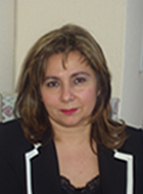 Prof. Eugenia BEZIRTZOGLOU Prof. Eugenia BEZIRTZOGLOU
Prof. Eugenia BEZIRTZOGLOU is Microbiologist - Biochemist (France) with a Degree in Medicine and 3 Masters in Biochemistry, Hematology (Human Biology), Prof. Eugenia BEZIRTZOGLOU is Microbiologist - Biochemist (France) with a Degree in Medicine and 3 Masters in Biochemistry, Hematology (Human Biology), Parasitology (Human Biology), DEA in Microbiology and a PhD in Microbiology with emphasis on Microbial Ecology. From 1988 to 2003, she had been elected Assoc. Prof. at Medical School of Ioannina University in Greece. Since 2003 she serves as Prof. in the Faculty of Agricultural Development, Department of Food Science and Technology, where she directs the Laboratories of: a) Microbiology, Biotechnology and Hygiene, b) Food Processing and c) Chemistry and Biochemistry Her research objectives are: The microbiological quality of foods, Microbial ecology of the normal microbiota, the antimicrobial activity of natural and synthetic compounds, the quality of aquatic ecosystems and etc. She has participated in 150 research publications in peer-review journals and 180 international conferences and over 60 research projects as researcher. Also she has coordinated 17 research projects funded by national or European funds as scientific principal investigator in the last 8 years in the Faculty of Agricultural Development, Department of Food Science and Technology. |
 Prof. Herbert BUCKENHUSKES Prof. Herbert BUCKENHUSKES |
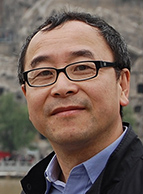 Prof. Pingfan RAO Prof. Pingfan RAO
Prof. Pingfan RAO received BEng in food technology from Fuzhou University of China in 1982, MSc in food science from Hiroshima University of Japan in 1986, and PhD in biochemistry from Osaka University of Japan in 1989. He is currently Prof. and founding Director of CAS.SIBS-Zhejiang Gongshang University Joint Center for Food and Nutrition Research, and a Prof. of Fuzhou University in China. He is President (2012-2014) of the International Union of Food Science and Technology (IUFoST), a fellow of International Academy of Food Science and Technology, Vice President of the Chinese Institute of Food Science and Technology. His research focuses primarily on identifying and characterizing bioactive proteins and expression and scale production of recombinant enzymes, protein derivatives as the active ingredients of tradition Chinese medicine and food, new methodology for cell separation and superoxide channels. |
 Prof. Fernando PEREZ RODRIGUEZ Prof. Fernando PEREZ RODRIGUEZ
Prof. Fernando PEREZ RODRIGUEZ undertook his degrees in Biological Science and in Food Science and Technology from the University of Córdoba in 1999 and 2002, respectively. He completed his PhD from the University of Córdoba (2007), which dealt with quantitative microbiological risk assessment and cross contamination in foods. He has published more than 40 articles in the most prestigious international food microbiology journals and several books concerning predictive microbiology in foods. He has been involved in several research projects at national and international level, conducting quantitative risk assessment studies and investigating cross contamination. |
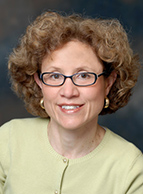 Prof. Zeynep ÜSTÜNOL Prof. Zeynep ÜSTÜNOL
Prof. Zeynep ÜSTÜNOL is currently a Prof. of Food Science and Human at Michigan State University. She received her BSc and MSc degrees in 1981 and 1983, respectively from Utah State University in Food Science. She completed her PhD degree in Food Science with a minor in Biochemistry at University of Kentucky. After a two year postdoctoral fellowship at University of Kentucky, she joined the faculty at Michigan State University in 1991. She is an active member of Institute of Food Technologists (IFT), American Dairy Science Association (ADSA), American Chemical Society (ACS) and American Association for Advancement of Science (AAAS). She is 2002 recipient of Fulbright Senior Research Scholar Award to New Zealand, and the 2005 recipient of American Dairy Science Association Milk Industry Foundation Outstanding Teaching Award. During 2004-2008 she served as the Editor and Senior Editor of highly respected Journal of Dairy Science. Currently, she serves on the review panel for Fulbright Awards. |
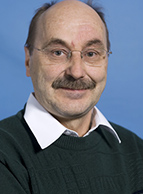 Prof. Tapani ALATOSSAVA Prof. Tapani ALATOSSAVA
Prof. Tapani ALATOSSAVA was born in Northern Finland in 1953. After his higher school examination in 1972, he started to study biochemistry and genetics at University of Oulu (Finland), and performed M.Sc. degree in biochemistry in 1979, and Ph.D. degree in genetics in 1987 (Finland). He has performed three long-term visits (altogether more than 4 years) abroad: |
 Prof.Mohamed A. KARMALI Prof.Mohamed A. KARMALI
Prof. Mohamed KARMALI graduated in Medicine from the University of Glasgow, Scotland, in 1972, and went on to specialise in Internal Medicine and Medical Microbiology at the Universities of Glasgow and Toronto. Formerly the Head of Microbiology at Toronto's Hospital for Sick Children, he is currently Director-General of the Laboratory for Foodborne Zoonoses, Public Health Agency of Canada and Adjunct Professor, Dalla Lana School of Public Health, University of Toronto. |
 Assoc. Prof.Berna MAGNUSON Assoc. Prof.Berna MAGNUSON
Assoc. Prof. Berna MAGNUSON is President of BMagnuson Consulting (www.bernamagnuson.com) and provides expertise in the area of safety and government regulation of foods, food ingredients and dietary supplements. She has written numerous peer-reviewed articles on the safety assessment of oral exposure to nanomaterials, especially as relates to food and dietary supplements. Berna obtained a BSc. degree in food science and nutrition, MSc degree in toxicology from the University of Saskatchewan and a PhD in Food and Nutritional Sciences from the University of Manitoba. She then completed post-doctoral training and was a faculty member at the Universities of Idaho and Maryland in the US before returning to Canada to work as a toxicology and regulatory consultant. She is also a part-time Associate Professor in the Dept of Nutritional Sciences in the Faculty of Medicine at the University of Toronto. Berna has published over 50 peer-reviewed articles, book chapters, and professional articles, is the Associate Editor of Food and Nutrion and is on the editorial board of several other journals. She is an active member of various advisory boards, expert panels, and professional associations. Berna has been recognized as a Fellow of the Academy of Toxicological Sciences. |
 Prof. Arun K. BHUNIA Prof. Arun K. BHUNIA
Prof. Arun K. BHUNIA received BVSc (DVM equivalent) from BCKV, West Bengal, India, PhD from the University of Wyoming, Laramie, USA, and postdoctoral training at the University of Arkansas, Fayetteville, USA. He is affiliated with the Center for Food Safety Engineering at Purdue University, the Purdue University Life Science program (PULSe), and Department of Comparative Pathobiology. His research focuses on: (a) Pathogen detection employing optical sensors including light scattering, fiber-optic and cell-based sensors, and (b) Host-Pathogen Interaction: Mechanism of pathogenesis for Listeria monocytogenes during intestinal phase of infection and control strategies using probiotics. He has published 136 refereed articles, 2 text books (Fundamental Food Microbiology; Foodborne Microbial Pathogens), 3 edited books, 15 book chapters, 33 proceeding articles, and delivered more than 100 invited talks, keynote and plenary talks in national and international venues. Dr. Bhunia teaches graduate levels courses on "Microbial Foodborne Pathogens", "Microbial Techniques for Food Pathogens", and Intestinal Microbiology and Immunology. He is also Editor-in-Chief of the Open Journal of Medical Microbiology; Open Journal of Applied Biosensor; Editor of the Journal of Nutrition and Food Sciences, Conference Papers in Biology, Journal of Biomedicine and Biotechnology, Antibody Technology, Gut Pathogens, and Editorial Board member of the Journal of Food Protection. Dr. Bhunia has been awarded 2 patents, received Purdue Agriculture Research Award (2003), Purdue Faculty Scholar (2005), Purdue Team Award (2006), Institute of Food Technology R&D Award (2009), Outstanding Graduate Educator Award from the Department of Food Science (2010, 2011) and the College of Agriculture (2013), and is a member of NACMCF (National Advisory Committee on Microbiological Criteria for Foods) of USDA-FSIS (2013-Present). |
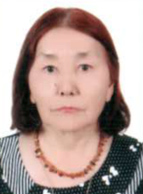 Prof. Mariam ALIMARDANOVA Prof. Mariam ALIMARDANOVA
Prof. Mariam ALIMARDANOVA is currently a Professor of Chair of Technology of a Foodstuff at Almaty Technological University. It has received the diploma of the engineer technologist in 1968. She received her Candidate of Technical Sciences degrees in 1978. She completed her Doctor of Technical Sciences degrees in 2007. She was Director Dairy Association of the Republic of Kazakhstan (DARK), Director of Research Institute of Food Technologies, Director of the Institute for Advanced Studies and Retraining, Deputy Director of Institute of Food Technologies in Almaty Technological University, now she is an active Мember Dairy Association of the Republic of Kazakhstan (DARK), Мember of Republican Educational and Methodical Council at the Ministry of Education and Science of the Republic of Kazakhstan, Member of the Academic council and dissertational council for protection of theses for a doctor's degree on technologies of food production at the Kazakh National Technical University of a name of Satpayev, at the Almaty Technological University. Participant of the “TEMPUS” program for the Master's of the safety of food products. |
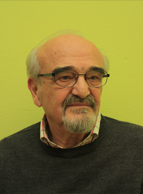 Prof. Efstathios ALICHANIDIS Prof. Efstathios ALICHANIDIS
Prof. Efstathios ALICHANIDIS spent more than 40 years of academic career at the Aristotle University of Thessaloniki (Laboratory of Dairy Technology). |
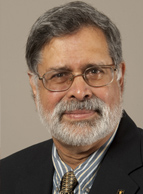 Prof. Purnendu C. VASAVADA Prof. Purnendu C. VASAVADA
Prof. Purnendu VASAVADA is a Professor Emeritus of Food Science, University of Wisconsin-River Falls and Principal and managing member of the PCV & Associates, LLC. |
 Assoc. Prof. Ömer AKINEDEN Assoc. Prof. Ömer AKINEDEN
Assoc. Prof. Ömer Akıneden received his veterinary degree from Istanbul University in Turkey in 1993. Soon after he passed the state equivalency examination of Veterinary Medicine, he joined the Justus Liebig University (JLU) in Giessen Germany for his doctoral studies at the Chair of Dairy Sciences in JLU Giessen under the supervision of Prof. Dr. habil. Ewald Usleber. After his PhD studies, there he received the post doc researcher and Assist. Prof. at the Institute of Food Sciences between 2001 and 2011, respectively. In 2013, he recently won his Assoc. Prof. degree on Food Hygiene and Technology in İstanbul, Turkey. Dr. Akıneden has been continuing his scientific studies as a full-time academic staff at the Chair of Dairy Sciences of JLU Giessen. During his scientific career he has gained significant expertise on food science and food safety as well as conducting successful national and multinational EC and Federal funded projects on the development, standardization and validation of microbiological and molecular-based diagnostic methods such as identification and genotyping of foodborne pathogens present especially in dairy products and other foods of animal origin. He has involved in many research projects related to public health and zoonotic diseases at national and international levels. His major interests are the development of contemporary diagnostic techniques such as DNA based ones for identification and differentiation of foodborne pathogens. Dr. Akıneden is also the member of Academic Council in Chair of Dairy Sciences of JLU Giessen. He has 30 peer-reviewed articles published in many reputable international SCI-indexed journals. He is married and has two sons.
|